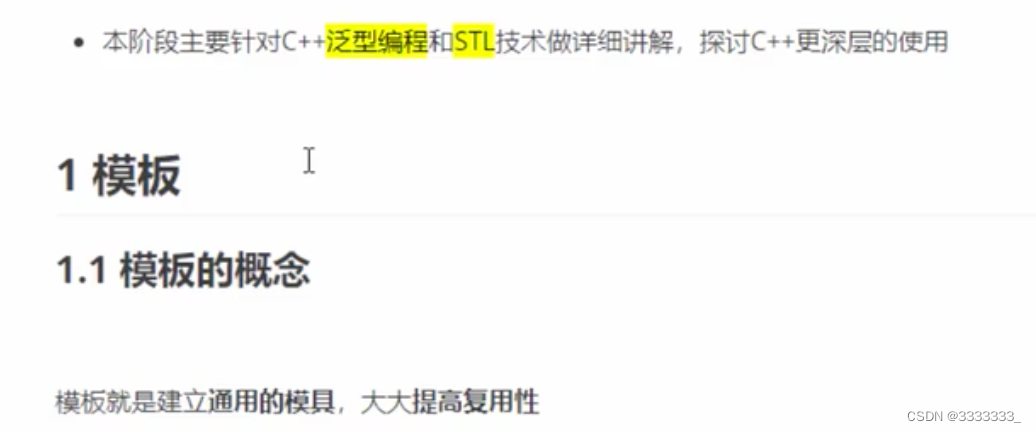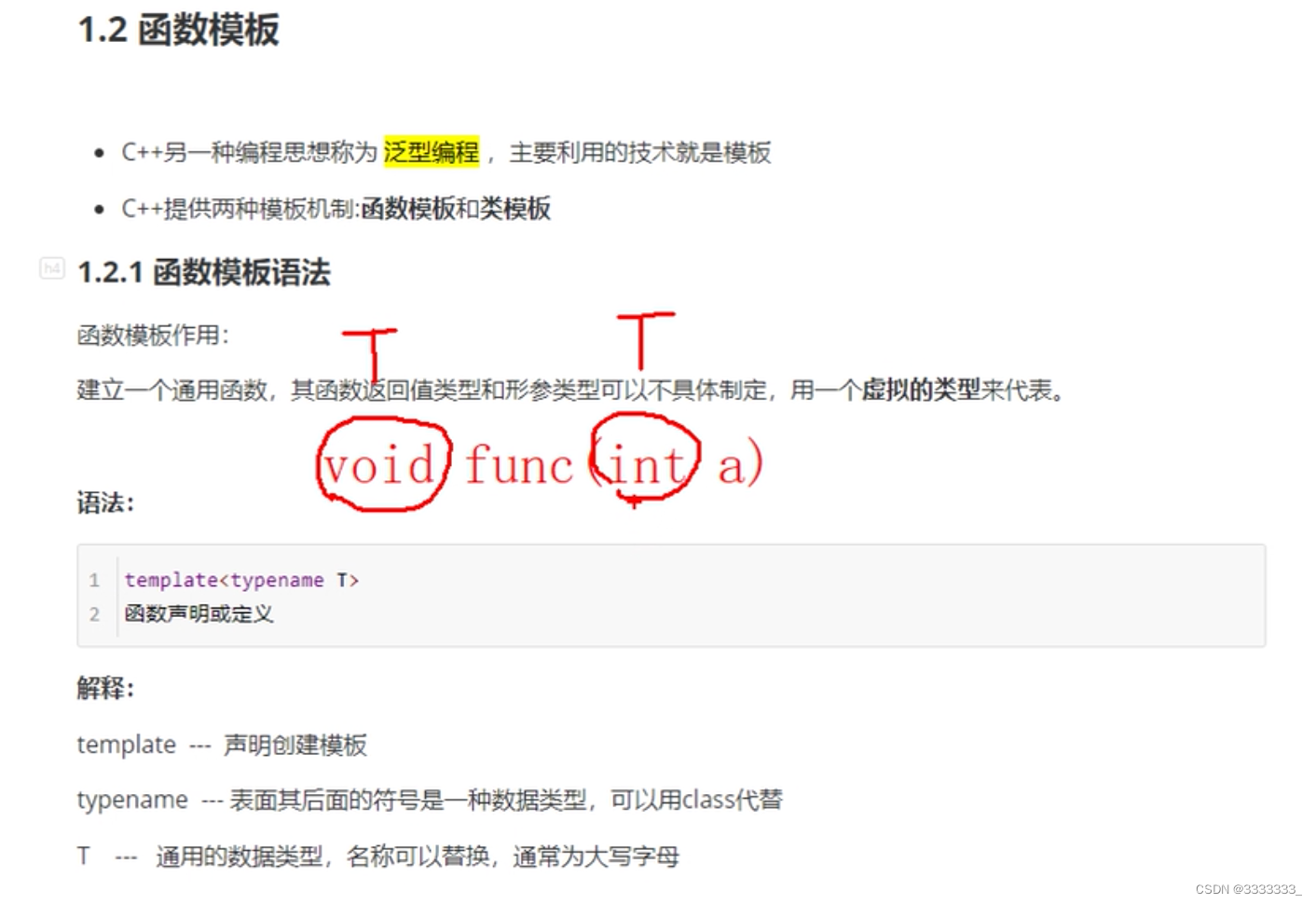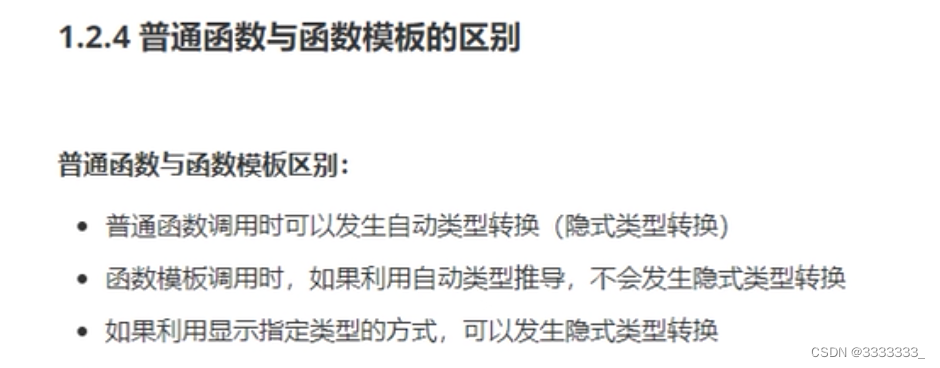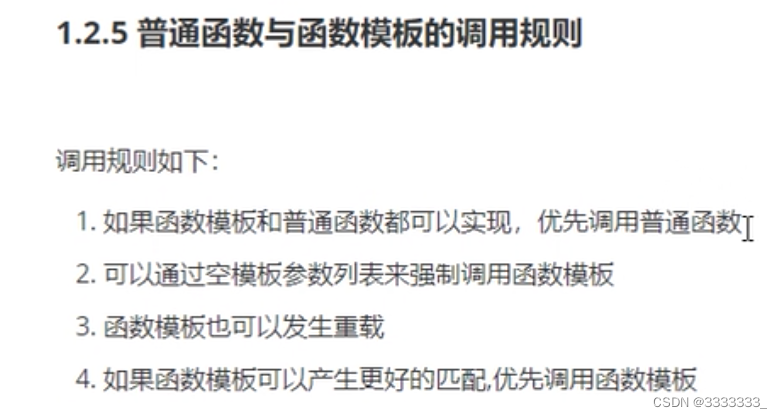



普通实现
#include <iostream>
#include <string>
#include <fstream>
using namespace std;
//函数模板
//交换两个整型交换函数
void swapInt(int &a, int &b) {
int temp = a;
a = b;
b = temp;
}
//交换两个浮点型函数
void swapDouble(double &a, double &b) {
double temp = a;
a = b;
b = temp;
}
void test() {
int a = 10;
int b = 20;
swapInt(a, b);
cout << "a=" << a << endl;
cout << "b=" << b << endl;
double c = 10.2;
double d = 20;
swapDouble(c, d);
cout << "c=" << c << endl;
cout << "d=" << d << endl;
}
int main() {
test();
return 0;
}
模板实现
#include <iostream>
#include <string>
#include <fstream>
using namespace std;
//函数模板
//交换两个整型交换函数
void swapInt(int &a, int &b) {
int temp = a;
a = b;
b = temp;
}
//交换两个浮点型函数
void swapDouble(double &a, double &b) {
double temp = a;
a = b;
b = temp;
}
//函数模板
template<typename T>
//声明一个模板,告诉编译器后面代码中紧跟着的T不要报错,T是一个通用数据类型
void mySwap(T &a, T &b) {
T temp = a;
a = b;
b = temp;
}
void test() {
int a = 10;
int b = 20;
swapInt(a, b);
cout << "a=" << a << endl;
cout << "b=" << b << endl;
double c = 10.2;
double d = 20;
swapDouble(c, d);
cout << "c=" << c << endl;
cout << "d=" << d << endl;
}
void test2() {
//使用函数模板有两种方式
int a = 10;
int b = 20;
//1 自动类型推到
mySwap(a, b);
cout << "a=" << a << endl;
cout << "b=" << b << endl;
//2 显示指定类型
double c = 10.2;
double d = 20.3;
mySwap<double>(c, d);
cout << "c=" << c << endl;
cout << "d=" << d << endl;
}
int main() {
// test();
test2();
return 0;
}

函数模板注意事项如下
#include <iostream>
#include <string>
#include <fstream>
using namespace std;
//函数模板注意是想
/*
* 1 自动类型推到 必须推导出一致的数据类型T才可以使用
*
* 2 模板必须要确定出T的数据类型,才可以使用
*
*/
//typename 可以替换成class
template<class T>
void mySwap(T &a, T &b) {
T temp = a;
a = b;
b = temp;
}
//1 自动类型推到 必须推导出一致的数据类型T才可以使用
void test() {
int a = 10;
int b = 20;
mySwap(a, b);//正确
char c = 'a';
// mySwap(a, c);//错误;必须推导出一致的数据类型T才可以使用
}
//template<typename T>//如果是注释的,test2是可以调用func();的
template<typename T>//如果是没注释的,test2是不可以调用func();的,因为模板必须没有确定出T的数据类型,需要显示指定类型调用 func<int>();
void func() {
cout << "func 调用" << endl;
}
void test2() {
// func();
func<int>();
}
int main() {
// test();
test2();
return 0;
}
函数模板案例-数组排序
#include <iostream>
#include <string>
#include <fstream>
using namespace std;
/*
*实现通用 对数组进行排序的函数
* 规则 从大到小
* 算法 选择排序
* 测试 char 数组、int 数组
*/
//交换函数模板
template<typename T>
void mySwap(T &a, T &b) {
int temp = a;
a = b;
b = temp;
}
//排序算法
template<typename T>
void mySort(T arr[], int len) {
for (int i = 0; i < len; i++) {
int max = i;
for (int j = i + 1; j < len; j++) {
if (arr[max] < arr[j]) {
max = j;
}
}
if (max != i) {
mySwap(arr[max], arr[i]);
}
}
}
//提供打印数组的模板
template<typename T>
void printArray(T arr[], int len) {
for (int i = 0; i < len; i++) {
cout << arr[i] << " ";
}
cout << endl;
}
void test() {
//测试char数组
char charArr[] = "badcfe";
int num = sizeof(charArr) / sizeof(char);
mySort(charArr, num);
printArray(charArr, num);
}
void test2() {
int arr[] = {32, 321, 3, 4324, 2, 543, 5, 46, 1};
int num = sizeof(arr) / sizeof(int);
mySort(arr,num);
printArray(arr, num);
}
int main() {
test();
test2();
return 0;
}

#include <iostream>
#include <string>
#include <fstream>
using namespace std;
/*
*学习普通函数与函数模板的区别
* 1 普通函数调用可以发生隐式类型转换
* 2 函数模板 用自动类型推导,不可以发生隐式类型转换
* 3 函数模板 用显示指定类型,可以发生隐式类型转换
*/
//普通函数
int myAdd(int a, int b) {
return a + b;
}
//函数模板
template<typename T>
T myAdd2(T a, T b) {
return a + b;
}
void test() {
int a = 10;
int b = 20;
cout << myAdd(a, b) << endl;
char c = 'c';
cout << myAdd(a, c) << endl;//发生隐式转换
double d = 10.2;
cout << myAdd(a, d) << endl;//发生隐式转换
//自动类型推导
// myAdd2(a, c);//报错,自动推导不会发生隐式类型转换
myAdd2<int>(a, c);//不报错,显示指定类型会发生隐式类型转换
}
int main() {
test();
return 0;
}


调用普通函数
#include <iostream>
#include <string>
#include <fstream>
using namespace std;
/*
*普通函数与函数模板掉好用规则
* 1 如果函数模板和普通函数可以调用,优先调用普通函数
* 2 可以通过空模板参数列表,强制调用 函数模板
* 3 函数模板可以发生函数重载
* 4 如果函数模板可以产生更好的匹配 优先调用函数模板
*/
void myPrint(int a, int b) {
cout << "调用普通函数" << endl;
}
template<class T>
void myPrint(T a, T b) {
cout << "调用函数模板" << endl;
}
void test() {
int a = 10;
int b = 20;
myPrint(a, b);
}
int main() {
test();
return 0;
}
报错 ,普通函数只有声明没有实现
#include <iostream>
#include <string>
#include <fstream>
using namespace std;
/*
*普通函数与函数模板掉好用规则
* 1 如果函数模板和普通函数可以调用,优先调用普通函数
* 2 可以通过空模板参数列表,强制调用 函数模板
* 3 函数模板可以发生函数重载
* 4 如果函数模板可以产生更好的匹配 优先调用函数模板
*/
void myPrint(int a, int b);
template<class T>
void myPrint(T a, T b) {
cout << "调用函数模板" << endl;
}
void test() {
int a = 10;
int b = 20;
myPrint(a, b);
}
int main() {
test();
return 0;
}
Undefined symbols for architecture x86_64:
"myPrint(int, int)", referenced from:
test() in main.cpp.o
ld: symbol(s) not found for architecture x86_64
clang: error: linker command failed with exit code 1 (use -v to see invocation)
make[3]: *** [first_demo] Error 1
make[2]: *** [CMakeFiles/first_demo.dir/all] Error 2
make[1]: *** [CMakeFiles/first_demo.dir/rule] Error 2
make: *** [first_demo] Error 2
通过空模板参数列表,强制调用函数模板
#include <iostream>
#include <string>
#include <fstream>
using namespace std;
/*
*普通函数与函数模板掉好用规则
* 1 如果函数模板和普通函数可以调用,优先调用普通函数
* 2 可以通过空模板参数列表,强制调用 函数模板
* 3 函数模板可以发生函数重载
* 4 如果函数模板可以产生更好的匹配 优先调用函数模板
*/
void myPrint(int a, int b);
template<class T>
void myPrint(T a, T b) {
cout << "调用函数模板" << endl;
}
void test() {
int a = 10;
int b = 20;
// myPrint(a, b);
//通过空模板参数列表,强制调用函数模板
myPrint<>(a, b);
}
int main() {
test();
return 0;
}
函数模板可以发生函数重载
#include <iostream>
#include <string>
#include <fstream>
using namespace std;
/*
*普通函数与函数模板掉好用规则
* 1 如果函数模板和普通函数可以调用,优先调用普通函数
* 2 可以通过空模板参数列表,强制调用 函数模板
* 3 函数模板可以发生函数重载
* 4 如果函数模板可以产生更好的匹配 优先调用函数模板
*/
void myPrint(int a, int b);
template<class T>
void myPrint(T a, T b) {
cout << "2个参数 调用函数模板" << endl;
}
template<class T>
void myPrint(T a, T b, T c) {
cout << "3个参数 调用函数模板" << endl;
}
void test() {
int a = 10;
int b = 20;
// myPrint(a, b);
//通过空模板参数列表,强制调用函数模板
myPrint<>(a, b);
myPrint<>(a, b, 30);
}
int main() {
test();
return 0;
}
如果函数模板可以产生更好的匹配 优先调用函数模板
#include <iostream>
#include <string>
#include <fstream>
using namespace std;
/*
*普通函数与函数模板掉好用规则
* 1 如果函数模板和普通函数可以调用,优先调用普通函数
* 2 可以通过空模板参数列表,强制调用 函数模板
* 3 函数模板可以发生函数重载
* 4 如果函数模板可以产生更好的匹配 优先调用函数模板
*/
void myPrint(int a, int b) {
cout << "调用普通函数" << endl;
}
template<class T>
void myPrint(T a, T b) {
cout << "2个参数 调用函数模板" << endl;
}
template<class T>
void myPrint(T a, T b, T c) {
cout << "3个参数 调用函数模板" << endl;
}
void test() {
int a = 10;
int b = 20;
// myPrint(a, b);
//通过空模板参数列表,强制调用函数模板
// myPrint<>(a, b);
// myPrint<>(a, b, 30);
//如果函数模板可以产生更好的匹配 优先调用函数模板,这里编译器觉得发生隐式转换还不如自动类型推导
char c1 = 'a';
char c2 = 'b';
myPrint(c1, c2);
}
int main() {
test();
return 0;
}

模板的局限性
1、正常实现,没问题
#include <iostream>
#include <string>
#include <fstream>
using namespace std;
/*
* 模板的局限性
* 模板并不是万能的,有些特定数据类型,徐亚用具体化方式做特殊实现
*
*/
template<typename T>
bool myCompare(T &a, T &b) {
return a == b;
}
void test() {
int i = 0;
int j = 1;
bool b = myCompare(i, j);
if (b) {
cout << "相等" << endl;
} else {
cout << "不相等" << endl;
}
}
int main() {
test();
return 0;
}
2、 自定义实现,有问题
#include <iostream>
#include <string>
#include <fstream>
using namespace std;
/*
* 模板的局限性
* 模板并不是万能的,有些特定数据类型,徐亚用具体化方式做特殊实现
*
*/
class Person {
public:
Person(int a, string n) {
age = a;
name = n;
}
int age;
string name;
};
template<typename T>
bool myCompare(T &a, T &b) {
return a == b;
}
void test() {
int i = 0;
int j = 1;
bool b = myCompare(i, j);
if (b) {
cout << "相等" << endl;
} else {
cout << "不相等" << endl;
}
}
void test2() {
Person p1(1, "Tom");
Person p2(1, "Tom");
bool b = myCompare(p1, p2);
if (b) {
cout << "相等" << endl;
} else {
cout << "不相等" << endl;
}
}
int main() {
// test();
test2();
return 0;
}
报错了
bool myCompare(T &a, T &b) {
return a == b;//Invalid operands to binary expression ('Person' and 'Person')
}
解决办法
1 重载==运算符,不过太麻烦了,要是有>或者
2 利用具体化的Person的版本实现代码,具体优化优先调用
#include <iostream>
#include <string>
#include <fstream>
using namespace std;
/*
* 模板的局限性
* 模板并不是万能的,有些特定数据类型,徐亚用具体化方式做特殊实现
*
*/
class Person {
public:
Person(int a, string n) {
age = a;
name = n;
}
int age;
string name;
};
template<typename T>
bool myCompare(T &a, T &b) {
return a == b;
}
//利用具体化的Person的版本实现代码,具体优化优先调用 (格式化后就换行了)
template<>
bool myCompare(Person &p1, Person &p2) {
if (p1.age == p2.age && p1.name == p2.name) {
return true;
}
return false;
}
void test() {
int i = 0;
int j = 1;
bool b = myCompare(i, j);
if (b) {
cout << "相等" << endl;
} else {
cout << "不相等" << endl;
}
}
void test2() {
Person p1(1, "Tom");
Person p2(1, "Tom");
bool b = myCompare(p1, p2);
if (b) {
cout << "相等" << endl;
} else {
cout << "不相等" << endl;
}
}
int main() {
// test();
test2();
return 0;
}

 C++模板详解
C++模板详解





 本文深入探讨C++中的函数模板应用,包括基本语法、注意事项及如何处理不同类型数据的排序操作。同时,文章还讨论了普通函数与函数模板的区别,并介绍了模板在特定情况下的局限性和解决方法。
本文深入探讨C++中的函数模板应用,包括基本语法、注意事项及如何处理不同类型数据的排序操作。同时,文章还讨论了普通函数与函数模板的区别,并介绍了模板在特定情况下的局限性和解决方法。
















 790
790










